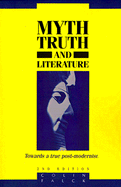Book contents
1 - Saussurian theory and the abolition of reality
Published online by Cambridge University Press: 03 May 2011
Summary
In this condition there may be discoverable under new forms certain spiritual illuminations, shining with a morality essentialized from experience directly, and not from previous precepts or preoccupations. It is as though a poem gave the reader as he left it a single, new word, never before spoken and impossible to actually enunciate, but self-evident as an active principle in the reader's consciousness henceforward.
hart craneThe founder of modern linguistics Ferdinand de Saussure – on whose insights into the nature of signs and language the greater part of the French and American literary theory of the past two decades has rather perilously come to depend – based the main arguments of his project for a newly scientific study of language on what are in fact a pair of philosophical axioms. These are: (1) what Saussure called his “Principle 1,” or “the principle of the arbitrary nature of the sign”; and (2) what might be called (though Saussure himself did not name or isolate it as such) “the principle of the relational nature of all linguistic meaning.” In his argument leading up to the statement of “Principle 1” Saussure remarks that
[s]ome people regard language, when reduced to its elements, as a naming-process only – a list of words, each corresponding to the thing that it names… This conception is open to criticism at several points. It assumes that ready-made ideas exist before words.
(p. 65)- Type
- Chapter
- Information
- Myth, Truth and LiteratureTowards a True Post-modernism, pp. 4 - 33Publisher: Cambridge University PressPrint publication year: 1994



